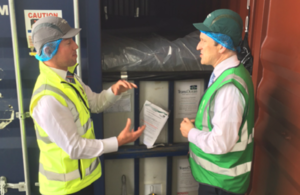Wine exports produced and bottled in UK threatened if UK leaves EU (Archived)
Exchequer Secretary visits Europe’s biggest bottling plant to warn that leaving the EU would drain investment into the UK.

Exchequer Secretary visits Europe’s biggest bottling plant to warn that leaving the EU would drain investment into the UK
Exchequer Secretary Damian Hinds has visited Accolade Park in Bristol. Whilst there he met with senior executives from the Wine and Spirit Trade Association (WSTA) who warned that the UK leaving the EU would threaten its place in the supply chains of the international wine industry.
During this meeting today (Thursday 26 May), Mr Hinds was told by industry body, WSTA, that exports of wine produced and bottled in the UK may fall if the UK leaves the EU and loses its access to the Single Market.
Currently wine manufactured in the UK can travel as freely to Amsterdam as it can to Aberdeen and the UK plays a prominent role in the supply chain for international wine companies who often choose the UK to bottle, label, transport and sell their products across Europe.
But the loss of access to the Single Market could mean the reintroduction of customs controls and trading barriers which could add additional costs to businesses operating here and make the UK a less attractive place to include in global supply chains.
Recent analysis published by the Treasury makes clear the South West, in particular, benefits from the UK’s membership of the EU with around 250,000 jobs in the region linked to the UK’s exports to other EU countries.
Exchequer Secretary to the Treasury, Damian Hinds said:
From wine to cars, the goods manufactured here in the South West are exported across Europe and beyond.
If the UK votes to leave the EU then the loss of access to the Single Market will result in a profound economic shock that will make this country permanently poorer. So, the message is clear, leaving the EU could drain investment away from the UK.
Miles Beale, Chief Executive of the Wine and Spirit Trade Association:
Britain has seen a meteoric rise in its capacity to import, bottle and re-export wine and this in part is down to a huge investment in UK bottling plants. The UK is the world’s second largest importer of wine by volume, after Germany; and second by value behind the United States.
Per head of the adult population the UK is the world’s leading major importer by both volume and value and accounts for 13% of all global wine imports – equivalent of the UK importing one bottle in 8 of all world wine imports.
Britain is the international wine trade’s destination of choice inside the EU and the other Northern hemisphere markets. It is the reason the UK remains arguably the most important wine trading nation in the world.
A recent survey carried out by the Wine and Spirit Trade Association (WSTA) found that the UK wine and spirit trade will be stronger if Britain remained in the European Union. As part of a consultation of its 300 plus members this message was endorsed by 90% of those who responded.
Further Information
- the WSTA is the UK organisation for the wine and spirit industry, representing over 300 companies producing, importing, transporting and selling wine and spirits. The WSTA works with its members to promote responsible production, marketing and sale of alcohol
- the South West exported £9.7 billion in goods to the European Union (EU) in 2015
- 64% of the goods exported from the South West go to the EU
- goods exports to the EU equated to around 7 per cent of the South West economy in 2014
- the South West has benefitted from £3.4 billion of inward foreign direct investment from EU members over the last 5 years
- there have been almost 130 foreign investment projects in the South West in the last 5 years from Europe, which have created or safeguarded over 13,000 jobs
- Accolade Park is a state of the art facility owned by Accolade Wines, producer of Hardys, Banrock Station, Echo Falls and Kumala and has an onsite workforce of 500, with many jobs in the wider supply chain, This supply chain that enables wine to be delivered to the consumer employs nearly 3000 people – including glass, carton and label manufacturers as well as logistics experts, haulage workers and sales teams